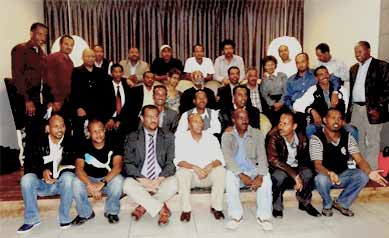Eritrea’s Succession Crisis: A Nation on the Brink
In the long arc of Eritrean history, few moments have been as ominous as the present. The country stands on the edge of a precipice—not because of natural calamities, foreign invasions, or economic collapse, but because of a dangerous void at its center: the absence of a succession plan.
Eritrea’s political order is not built on law, institutions, or shared leadership. It is built around one man—President Isaias Afwerki. When he inevitably exits the stage, whether by death or incapacitation (ካብ ሞት ዘምልጥ የልቦን — no one escapes death), Eritrea will face its most profound crisis since independence.
This is not alarmism. It is a sober truth backed by history and observation. The question isn’t if the tree or the camel will fall, but when. And as the proverbs warn:
“When the tree falls, everyone comes with their axe.” ዝወደቀት ገረብ ፋስ ይበዝሓ
“When the camel collapses, the knives are drawn.” إذا سقط الجمل، سلّت السيوف
Strongman rule without a succession plan is inherently unstable. Political thinkers have long warned of the dangers of unmitigated power. Good governance requires limits, balance, and institutions that can outlast individuals. Eritrea has none of these. It is a personalist authoritarianism: a one-man show where institutions are gutted, dissent is crushed, and power is hoarded.
There are no term limits, no vice president, and no functioning constitution. The ruling party, the PFDJ, hasn’t held a congress since 1994. It exists more as a relic than a political body, floating on the revolutionary legitimacy of the past. That legacy has proven to be more of a trap than a plan.
This may offer short-term control, but when the center collapses, it guarantees long-term fragility. There is no scaffolding to hold the nation together. Every Eritrean—whether one supports or opposes the regime—should be deeply concerned. In Eritrea, even regime supporters are politically irrelevant. The only difference is that opponents know they are irrelevant.
In the absence of institutions, the military is the only semi-coherent structure we have. But even it is fractured. Generals control their own fiefdoms. Brigadier General Abraha Kassa holds sway over security. General Filipos Woldeyohannes commands the army. These men wield force, but not the vision to unify a nation. Clad in oversized fatigues, they wear the weight of a struggle they no longer understand—divided in purpose, yet stitched together by the emptiness of borrowed authority.
Without a succession plan, Eritrea risks a future of infighting, fragmentation, and warlordism. Power struggles cloaked in patriotic language will mask raw self-interest. In essence, we will have more of what we have now—but much worse and fiercer. The result won’t be peaceful transition; it will be collapse. Somalia after Siad Barre is a cautionary tale Eritrea cannot afford to ignore.
What is needed now is a restoration of vision, function, and planning. The PFDJ must convene a congress—not tomorrow, not “when the time is right,” but now. Such a congress could rebuild the party’s legitimacy, clarify its mission, and most critically—create a plan for leadership transition.
And the opposition in the diaspora must also coalesce. Fragmentation is failure; unity is power. The essence of the opposition should be to inspire the very people it seeks to serve, with words and actions that align with the realities of Eritreans both inside and outside the country. This is the only way to inspire Eritreans to rally for change. Waiting is not a strategy—because in the long term, we will all be dead.
A PFDJ-led congress would allow veteran tegadelti—the moral core of the liberation struggle—to help guide a peaceful transition. It would show the nation that dignity and stability are possible without dictatorship. It would reframe the legacy of the EPLF not as myth, but as a model for ethical leadership.
Isaias Afwerki will not initiate this shift. But respected voices from within the revolutionary generation still can. There are a few left. And if they do, even the most immovable structure can bend. History has shown this time and time again: when moral authority meets urgency, change becomes inevitable.
Eritrea’s independence was built not just with bullets, but with ideals—justice, sacrifice, self-reliance, love of people and country. Those ideals can still shape the future, but only if we act.
Yes, the tree will fall and the camel will collapse. But what grows in their shadows depends on what we plant today. When was the best time to plant a tree? Thirty-four years ago. And the second-best time? Now.
It starts by saying—clearly, urgently, and without apology: Isaias, hold the congress—or history will hold you.
N.B. I’ll be sharing my reflections every Sunday. If you share similar convictions, feel free to reach out via email: weriz@yahoo.com




Awate Forum